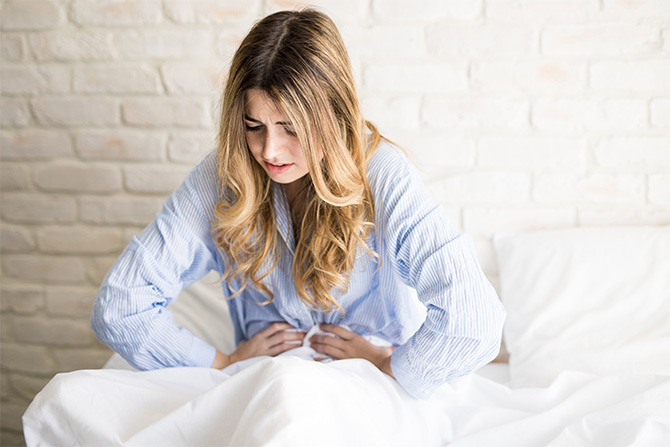
Overview [1]
Symptoms [2]
Causes [3]
Prescription [4]
Health Tips [5]
While there has been debate over its legitimacy, premenstrual syndrome (PMS) is real and can be devastating to some women and their families. The symptoms of PMS affect between 50 and 70 percent of women. It is so common that many women believe PMS is normal. Symptoms typically appear 7 to 14 days before menstruation but may occur at different times and at varying degrees of intensity throughout the cycle. PMS and terrible periods are not an inevitable part of being female; PMS is not normal. Having a period need not impair one’s daily life.
Symptoms
Symptoms of PMS vary greatly in occurrence and severity from woman to woman and may be physical, behavioural, or emotional. There are many possible symptoms; some of the more common ones are below.
Physical symptoms:
- Altered sex drive
- Back aches
- Dizziness
- Fatigue and insomnia
- Headaches and migraines
- Heart palpitations
- Herpes and other signs of reduced immunity
- Skin problems
- Swollen and tender breasts
- Uterine cramps
- Water retention
Gastrointestinal:
- Abdominal bloating
- Changes in appetite
- Constipation and diarrhea
- Increased cravings, usually for carbohydrates, chocolate, and sugar
Mental/emotional:
- Angry outbursts that are difficult to control, hence PMS’s categorization as a psychiatric condition or hysteria
- Moodiness, anxiety, irritability or depression
Causes
In earlier days, PMS was believed to be a type of hysteria (from the Greek word for uterus, hystera) and was treated as a nervous condition associated with the loss of emotional control and functional disturbances.
Hormonal imbalances are a factor and may be due to estrogen excess; an excess or deficiency in progesterone; thyroid imbalances; high levels of aldosterone, an adrenal hormone that causes muscle spasms; and prolactin excess.
Perimenopause and menopause may be a time when women experience the most severe PMS symptoms, as the body’s hormonal balances are in flux.
PMS is linked to a poor diet high in processed foods, a sedentary lifestyle, stress, or a stagnant liver or bowel congestion.
Some research suggests that increased estrogen is associated with decreased serotonin, the ‘feel good’ hormone. Serotonin helps regulate mood, and its deficiency is linked to depression.
Deficiencies or excess prostaglandins may also lead to PMS symptoms. Prostaglandins are hormone-like substances that regulate a range of physiological responses, including inflammation, muscle contraction, and some reproductive functions.
Prescription for Health
Deficiencies in nutrients such as magnesium, vitamins A and E and B-complex, particularly B6, may also contribute to PMS. Women with PMS often eat more refined sugars, carbohydrates, salt and dairy products. Vegetarian women tend to experience less PMS, suggesting a link with meat and dairy consumption (these animal-based foods contain high levels of xenoestrogens). Women who suffer from PMS also tend to have low levels of gamma linolenic acid (GLA) and other essential fats.
| Nutrient | Dosage | Action |
|---|---|---|
| Multivitamin with minerals (contains no iron) |
As directed | Ensures adequate nutrient status
B vitamins are essential for treating PMS, along with a foundation of good nutrients |
| Calcium D-glucarate* | 150 mg | Important for healthy metabolism of estrogen; supports normal cell growth |
| Curcumin* (95% curcumin) |
50 mg | Prevents abnormal cell growth; detoxifies cancer-causing forms of estrogen |
| Indole-3-carbinol* | 150 mg | Normalizes the estrogen-to-progesterone ratios, helping to reduce PMS symptoms
Keeps healthy estrogen from converting into the cancer-causing form Has been shown to reverse abnormal PAP tests within 3 menstrual cycles |
| Green tea extract* | 100 mg | Protects against abnormal cell growth; detoxifies excess estrogens |
| Rosemary extract* | 25 mg | Reduces tumor formation; antioxidant; important for healthy thyroid function |
| Di-indolylmethane (DIM)* | 50 mg | Antioxidant, reduces risk of cancer |
| Sulforaphane* | 200 mcg | Reduces risk of cancer; stops abnormal cell growth; helps balance hormones |
| Chaste tree berry (vitex)* | 80 mg | Normalizes menstrual cycle and stops PMS |
| Zinc* | 6 mg | Zinc helps to increase progesterone and decrease estrogen
PMS suffers are more likely to have low zinc |
| Coenzyme fully reacted B-complex: | Look for a minimum of the following per daily dose:
B1 – 100mg B2 – 7.5 mg Niacin – 353 mg B5 – 300 mg B6 – 100 mg B12 – 1000 mcg Folate – 1000 mcg |
Reduces PMS symptoms; improves mood and reduces anxiety |
| Borage Oil | 2000 mg daily | Helps control inflammatory prostaglandins, and reduces breast tenderness |
| Saffron Crocus Sativus | 30 mg daily | Improves mood; calms anxiety and nervousness, helps mild depression; improves overall PMS symptom severity |
| St. John’s Wort | 900 mg | Significantly improves PMS symptoms |
*Can be found in one formula
Health Tips to Enhance Healing
- Cut back on caffeine from all sources (chocolate, soda pop, coffee and black tea). Drink herbal tea.
- Eat a high-fiber diet with plenty of organic fruits and vegetables which help to eliminate excess estrogen.
- Eat only organic meats and eliminate dairy from the diet; both contain high amounts of xenoestrogens.
- Eliminate all xenoestrogens from diet, home and body care items. Avoid chemicals on EWG’s Dirty Dozen Endocrine Disrupters [6]
- Have thyroid levels checked. Low thyroid hormone levels create severe PMS symptoms.
- Meditation, exercise and acupuncture are techniques that may help reduce the symptoms of PMS. Also, get plenty of rest.